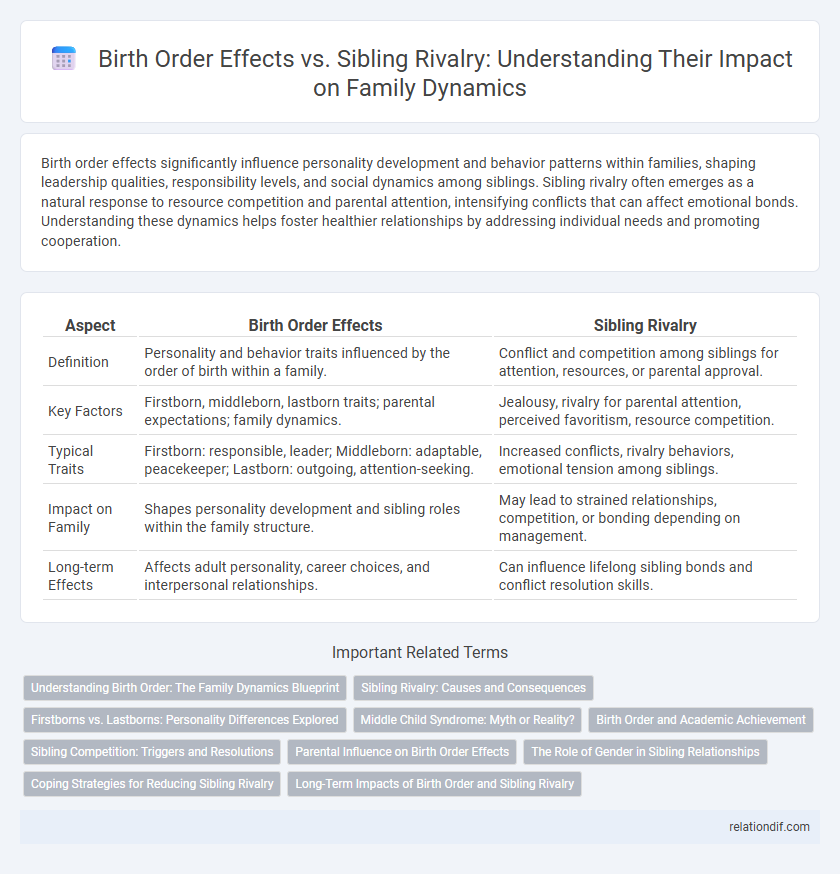Birth order effects significantly influence personality development and behavior patterns within families, shaping leadership qualities, responsibility levels, and social dynamics among siblings. Sibling rivalry often emerges as a natural response to resource competition and parental attention, intensifying conflicts that can affect emotional bonds. Understanding these dynamics helps foster healthier relationships by addressing individual needs and promoting cooperation.
Table of Comparison
| Aspect | Birth Order Effects | Sibling Rivalry |
|---|---|---|
| Definition | Personality and behavior traits influenced by the order of birth within a family. | Conflict and competition among siblings for attention, resources, or parental approval. |
| Key Factors | Firstborn, middleborn, lastborn traits; parental expectations; family dynamics. | Jealousy, rivalry for parental attention, perceived favoritism, resource competition. |
| Typical Traits | Firstborn: responsible, leader; Middleborn: adaptable, peacekeeper; Lastborn: outgoing, attention-seeking. | Increased conflicts, rivalry behaviors, emotional tension among siblings. |
| Impact on Family | Shapes personality development and sibling roles within the family structure. | May lead to strained relationships, competition, or bonding depending on management. |
| Long-term Effects | Affects adult personality, career choices, and interpersonal relationships. | Can influence lifelong sibling bonds and conflict resolution skills. |
Understanding Birth Order: The Family Dynamics Blueprint
Birth order significantly shapes personality traits and family roles, influencing how siblings interact and perceive each other. Firstborns often assume leadership and responsibility, while middle children may develop diplomacy skills to navigate sibling rivalry and seek attention. Understanding these dynamics provides insight into the underlying causes of conflict and cooperation within families.
Sibling Rivalry: Causes and Consequences
Sibling rivalry stems from competition for parental attention, resources, and emotional support, often intensifying in families with closely aged children. This rivalry can lead to long-term consequences such as strained sibling relationships, increased stress, and behavioral issues in both children and parents. Understanding the underlying causes, including personality differences and parental favoritism, is essential for mitigating conflicts and fostering healthier family dynamics.
Firstborns vs. Lastborns: Personality Differences Explored
Firstborns often exhibit leadership qualities, responsibility, and higher achievement motivation due to parental expectations and early undivided attention, while lastborns generally display increased sociability, creativity, and risk-taking behaviors influenced by more relaxed family dynamics. Birth order shapes distinct personality traits, where firstborns tend to be conscientious and organized, contrasting with lastborns' tendency toward novelty-seeking and charm. Sibling rivalry intensifies these differences as competition for parental resources prompts firstborns to assert authority, whereas lastborns develop strategies to gain approval through social and emotional skills.
Middle Child Syndrome: Myth or Reality?
Middle Child Syndrome, often characterized by feelings of neglect or invisibility, has been a subject of debate among psychologists studying birth order effects. Research indicates that while middle children may experience unique family dynamics, sibling rivalry plays a more significant role in shaping their behavior and self-esteem than birth order alone. Empirical studies suggest that environmental factors and parenting styles have a stronger impact on middle children's development than the myth of birth order-based psychological traits.
Birth Order and Academic Achievement
Birth order significantly influences academic achievement, with firstborn children often exhibiting higher performance due to increased parental attention and expectations. Later-born siblings may experience diluted resources but develop social skills from sibling interactions, which can also impact learning outcomes. Understanding these dynamics helps tailor educational support to maximize each child's potential within the family structure.
Sibling Competition: Triggers and Resolutions
Sibling competition often arises from limited parental attention and resources, intensifying rivalry especially among similarly aged siblings. Triggers include perceived favoritism, differences in achievements, and struggles for autonomy within the family hierarchy. Effective resolutions involve establishing clear family rules, promoting open communication, and encouraging cooperative activities to foster mutual respect and understanding.
Parental Influence on Birth Order Effects
Parental influence plays a crucial role in shaping birth order effects, often moderating the intensity of sibling rivalry through differential parenting styles and expectations. Parents may unconsciously reinforce birth order stereotypes, such as treating firstborns as responsible leaders and laterborns as more rebellious or sociable, which impacts children's personality development and sibling dynamics. By consciously adopting equitable parenting practices, parents can reduce rivalry and foster healthier sibling relationships regardless of birth order.
The Role of Gender in Sibling Relationships
Gender significantly influences sibling dynamics, often shaping birth order effects by reinforcing traditional roles and expectations within the family. Brothers and sisters may experience rivalry differently, with gender norms affecting competition, cooperation, and emotional bonds. Research shows that same-gender siblings tend to have more intense rivalry, while opposite-gender siblings often display more complementary interactions.
Coping Strategies for Reducing Sibling Rivalry
Effective coping strategies for reducing sibling rivalry include establishing clear family rules and consistent discipline to promote fairness among children. Encouraging open communication and teaching conflict resolution skills help siblings express emotions constructively and develop empathy. Creating individual time with each child strengthens parent-child bonds, reducing competition and birth order-related conflicts.
Long-Term Impacts of Birth Order and Sibling Rivalry
Birth order significantly influences personality traits, with firstborns often exhibiting leadership skills, middle children developing neutrality, and youngest siblings tending toward sociability. Sibling rivalry can intensify these roles, leading to long-term effects such as competitiveness or emotional insecurity that shape adult relationships and self-esteem. Understanding these dynamics helps address behavioral patterns and promotes healthier family interactions over time.
birth order effects vs sibling rivalry Infographic

 relationdif.com
relationdif.com